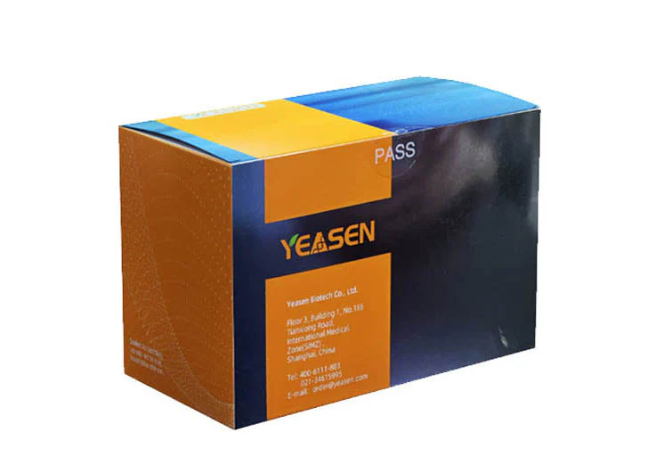Description
Firefly luciferase is a protein with a molecular weight of about 61 kDa, which can catalyze the oxidation of luciferin to oxyluciferin in the presence of ATP, magnesium ions and oxygen. It emits bioluminescence with a wavelength of around 560 nm. Renilla luciferase is a protein with a molecular weight of about 36 kDa, which can catalyze the oxidation of coelenterazine to coelenteramide in the presence of oxygen, and emits a wavelength of 480 nm during the oxidation process. about bioluminescence. Both bioluminescence can be measured by chemiluminescence. The detection principle is shown in the figure 1:

Figure 1: Firefly and Renilla luciferase assay schematic
Usually, the 5´UTR or promoter of the target gene is cloned upstream of Firefly Luciferase, or the 3´UTR is cloned downstream of Firefly Luciferase, and the transcriptional regulation effect of the promoter or regulatory element is detected by detecting the amount of firefly luciferase. Renilla Luciferase was used as an internal control to eliminate differences in cell number, transfection efficiency, etc. The Dual Luciferase Reporter Gene Assay Kit uses luciferin as a substrate to detect the activity of the firefly luciferase reporter gene, and then uses coelenterazine as a substrate to detect Renilla luciferin while quenching the fluorescence reaction. Enzyme reporter gene activity. The kit has the characteristics of high sensitivity.
Features
Enhanced Lysis Capability: Capable of completely lysing the vast majority of cell types.
Stronger Signal: Precise detection of weak promoter expression.
Higher Sensitivity: Detectable down to 10-20 picomoles of luciferase molecules.
Broader Linear Range: Linear detection range exceeds 8 orders of magnitude of enzyme concentration.
Applications
Verification of miRNA interactions with target gene 3'UTRs
Verification of lncRNA-miRNA interactions
Verification of transcription factor regulation in the promoter region
Signaling pathway analysis
SNP activity analysis
Specifications
|
Form |
liquid |
|
Luciferase |
Firefly and Renilla |
|
Signal Half-life |
30 min |
|
Number of Product Components |
5 |
|
Workflow |
Two Step |
Components
|
Components No. |
Name |
11402ES60 |
11402ES80 |
|
11402-A |
Cell Lysates |
20 mL |
10×20 mL |
|
11402-B |
Firefly Luciferase Buffer |
10 mL |
10×10 mL |
|
11402-C |
Firefly luciferase substrate (50 ×) |
200 μL |
10×200 μL |
|
11402-D |
Renilla Luciferase Buffer |
10 mL |
10×10 mL |
|
11402-E |
Renilla Luciferase substrate (50 ×) |
200 μL |
10×200 μL |
Shipping and Storage
The Dual Luciferase Reporter Gene Assay Kit products should be stored at -15℃ ~ -25℃ for 1 year.
Figures

Figure1. YEASEN (Cat#: 11402) has a fluorescence intensity comparable to that of Brand P.

Figure2. YEASEN (Cat#: 11402) detection reagents interact with luciferase to achieve optimal luminescence intensity. After the addition of Renilla luciferase substrate, the bioluminescence of firefly luciferase is quenched: it can be essentially completely quenched.
Documents:
Safety Data Sheet
Manuals
Citations & References:
[1] Wang H, Yang J, Cai Y, Zhao Y. Macrophages suppress cardiac reprogramming of fibroblasts in vivo via IFN-mediated intercellular self-stimulating circuit [published correction appears in Protein Cell. 2024 Dec 2;15(12):938. doi: 10.1093/procel/pwae038]. (IF=21.1)
[2] Zhao L, Zhu Y, Tao H, et al. Ailanthone ameliorates pulmonary fibrosis by suppressing JUN-dependent MEOX1 activation. Acta Pharm Sin B. 2024;14(8):3543-3560. doi:10.1016/j.apsb.2024.04.013(IF=14.5)
[3] Wu X, Chen S, Zhang Z, et al. A viral small interfering RNA-host plant mRNA pathway modulates virus-induced drought tolerance by enhancing autophagy. Plant Cell. 2024;36(9):3219-3236. doi:10.1093/plcell/koae158(IF=12.6)
[4] Xuan H, Li Y, Liu Y, et al. The H1/H5 domain contributes to OsTRBF2 phase separation and gene repression during rice development. Plant Cell. 2024;36(9):3787-3808. doi:10.1093/plcell/koae199(IF=12)
[5] Han Y, Hu Q, Gong N, et al. Natural variation in MORE GRAINS 1 regulates grain number and grain weight in rice. J Integr Plant Biol. 2024;66(7):1440-1458. doi:10.1111/jipb.13674(IF=11.4)
[6] Pan M, Luo M, Liu L, et al. EGR1 suppresses HCC growth and aerobic glycolysis by transcriptionally downregulating PFKL. J Exp Clin Cancer Res. 2024;43(1):35. Published 2024 Jan 29. doi:10.1186/s13046-024-02957-5(IF=11.3)
[7] Hao X, Wang S, Fu Y, et al. The WRKY46-MYC2 module plays a critical role in E-2-hexenal-induced anti-herbivore responses by promoting flavonoid accumulation. Plant Commun. 2024;5(2):100734. doi:10.1016/j.xplc.2023.100734(IF=10.5)
[8] Wu J, Li P, Li M, et al. Heat stress impairs floral meristem termination and fruit development by affecting the BR-SlCRCa cascade in tomato. Plant Commun. 2024;5(4):100790. doi:10.1016/j.xplc.2023.100790(IF=10.5)
[9] Chen L, Xia S, Wang F, et al. m6A methylation-induced NR1D1 ablation disrupts the HSC circadian clock and promotes hepatic fibrosis. Pharmacol Res. 2023;189:106704. doi:10.1016/j.phrs.2023.106704(IF=10.33)
[10] Niu MX, Feng CH, He F, et al. The miR6445-NAC029 module regulates drought tolerance by regulating the expression of glutathione S-transferase U23 and reactive oxygen species scavenging in Populus. New Phytol. 2024;242(5):2043-2058. doi:10.1111/nph.19703(IF=9.4)
[11]Huang T, You Q, Huang D, et al. A positive feedback between PDIA3P1 and OCT4 promotes the cancer stem cell properties of esophageal squamous cell carcinoma. Cell Commun Signal. 2024;22(1):60. Published 2024 Jan 22. doi:10.1186/s12964-024-01475-3(IF=8.4)
[12]Wang S, Liu Y, Hao X, Chen Y, Wang Z, Shen Y. Enhancing plant defensins in a desert shrub: Exploring a regulatory pathway of AnWRKY29. Int J Biol Macromol. 2024;270(Pt 1):132259. doi:10.1016/j.ijbiomac.2024.132259(IF=8.2)
Payment & Security
Your payment information is processed securely. We do not store credit card details nor have access to your credit card information.
Inquiry
You may also like
FAQ
The product is for research purposes only and is not intended for therapeutic or diagnostic use in humans or animals. Products and content are protected by patents, trademarks, and copyrights owned by Yeasen Biotechnology. Trademark symbols indicate the country of origin, not necessarily registration in all regions.
Certain applications may require additional third-party intellectual property rights.
Yeasen is dedicated to ethical science, believing our research should address critical questions while ensuring safety and ethical standards.

